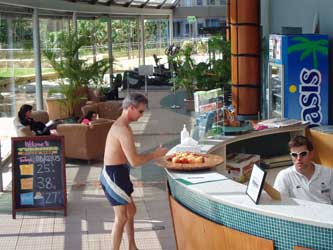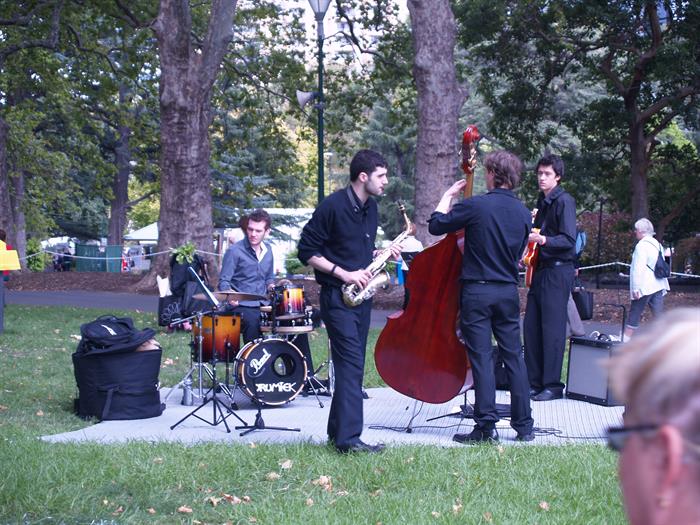 Recreation services should aspire to demonstrate and accomplish a commitment to the premise that access to human services is a right, not a privilege, and human services should enrich people’s lives, by helping those correct deficiencies in their own self-esteem and gain a sense of satisfaction and self worth.
Recreation services should aspire to demonstrate and accomplish a commitment to the premise that access to human services is a right, not a privilege, and human services should enrich people’s lives, by helping those correct deficiencies in their own self-esteem and gain a sense of satisfaction and self worth.
In order for the recreation and leisure industry to evolve to meet consumer needs and demands we must think about the way in which recreation services are managed.
This course builds on Leisure Management I to provide the student with skills and knowledge in Human Resource Management specific to the Leisure industry.
There are 8 lessons in this course:
- Work Schedules
- Work Teams
- Workplace Efficiency
- Recruitment
- Staff Performance
- Workplace Communications
- Staff Grievances
- Developing a Staff Manual
Each lesson culminates in an assignment which is submitted to the school, marked by the school's tutors and returned to you with any relevant suggestions, comments, and if necessary, extra reading.
AIMS
- Manage work schedules.
- Manage a work team
- Develop work team performance, to improve productivity and efficiency
- Manage the recruitment of new staff.
- Manage performance of individual members of staff.
- Maintain good communication with staff.
- Deal with staff grievances.
- Produce a staff manual for a workplace.
WHAT YOU WILL DO
- Prepare a work schedule, in accordance with a given job specification.
- List items of information which legally must be maintained in staff records.
- Explain different methods of maintaining work records.
- Calculate pay for a specified case study, including deductions for taxation and superannuation.
- Write a procedure for the maintenance of essential work records, in a specified recreation workplace, and in accordance with Quality Assurance Standard 9002.
- Explain different delegation techniques appropriate to a specified recreation workplace.
- Develop procedures to ensure different work tasks in a recreation workplace are performed in accordance with employer policy.
- Plan work programs, for different situations, including *delivery of a specified activity program *maintenance of a specified recreation facility.
- Develop a procedure to monitor work performance which satisfies the Quality Assurance Standard 9002.
- Develop criteria for evaluating team performance in different situations.
- Evaluate performance of a team, using criteria developed in 3.1.
- Analyse evaluation made of the performance of a work team.
- Develop recommendations for improvement of work team performance evaluation.
- Develop a summary for a work team training program, in response to specified recommendations which have been developed.
- Analyse staff needs in different recreation workplaces you visit, to determine areas where adjustments may be desirable for allocated manpower hours.
- Explain the purpose of job specifications, including control of work tasks.
- Develop strategies to locate potential employees, for different specified situations in the recreation industry, detailing those strategies.
- Write copy for specified job advertisements, including *a classified of thirty five words *a small display advertisement.
- List criteria for staff selection, in a specified situation.
- Plan a standard job interview, in accordance with a given job specification, to run for twenty minutes.
- Explain initiation procedures for a new member of staff, in accordance with a given job specification and specified situation.
- Define "probation period" in a specific workplace.
- Compare the legal implications of recruiting new staff in accordance with different specified procedures.
- Explain differences in staff recruitment processes in different large organisations.
- Explain different methods of assessing work productivity.
- Design an Employee Performance Appraisal Form for a specified situation in the recreation industry.
- List difficulties in using employee appraisal forms.
- Evaluate the performance of different employees, in different recreation workplaces, using staff appraisal forms.
- Develop a list of procedures to review changes, in the skills of an employee.
- Explain career advancement opportunities for staff in different recreation workplaces you investigate.
- Explain career paths for different different specified recreation industry jobs using illustrations.
- Explain the purpose of staff meetings in a specified recreation organisation.
- Explain the effectiveness of communication systems between staff and management in different, specific, recreation organisations.
- Write an organisational procedure, to provide management with feedback from employees on any work related issues.
- Explain different techniques of conflict resolution, appropriate to a specified problem in the workplace.
- List guidelines for maintaining morale in a workplace.
- Explain different types of grievance, in a specific workplace.
- Explain the role of an employee or union representative in dealing with a grievance.
- Explain the role of a supervisor in dealing with a grievance in a specific case study.
- List guidelines to follow when dealing with a grievance.
- Develop a formal procedure for dealing with grievances in a specified workplace situation.

LEARN HOW DO GET A GOOD TEAM?
Good staff will make or break any leisure enterprise.
Getting to the point of having a good team starts with having a good manager, then employing people with potential, and over time then nurturing their potential.
Staff need to be knowledgeable, have a good attitude toward their work, and have the capacity to improve over time.
The staff selection process is critical; but training and motivating staff is every bit as important as choosing the best applicant in the first instance
Be Smart about Who you have Working with Who.
Staff will develop knowledge and attitude according to who they are working alongside. Knowledge management is the concept that ideas and experience can be implicitly and explicitly transferred between staff members.
Staff members who have significant experience in certain areas are more likely to be paired with inexperienced staff members in the same areas in order to facilitate training. For instance, if an instructor is very qualified in taking spinning classes they will tend to be paired with an unqualified member of staff who will act as a mentor. The reason why this is done is because it is recognised that whilst the spinning bikes are needed to conduct the class there are so many spin bike providers these can be bought reasonably cheaply.
It is rare that a client will leave a class because of a spin bike. Rather, it is more likely that a customer will stop attending a class because they do not like the instructor who is not experienced enough. Therefore, customer service is viewed from the point of knowledge transfer (which includes the transfer of experience) between different staff members. The example of the spinning class is only one instance where this can work. It is also used as a method to train managers.